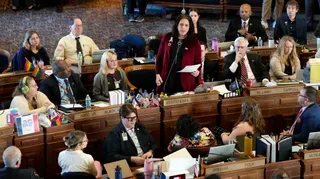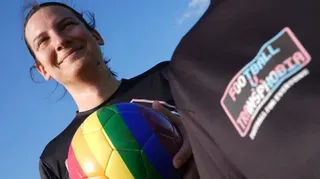December 21, 2012
Queens Woman Files Trans Discrimination Lawsuit Against NYC HRA
David Perry READ TIME: 6 MIN.
A recently filed lawsuit brought by a transgender woman against the New York City Human Resources Administration (HRA) reveals persistent and entrenched transphobia and transgender discrimination in the city's public services.
"Transgender individuals are constantly forced to accept harassment or give up their benefits," said Richard Saenz, staff attorney at Queens Legal Services and Estrella's lawyer. "That's not a choice that anyone should be forced to make, particularly at agencies that serve as a last defense against poverty, homelessness, and poor health."
In May 2011, Jolie Estrella legally changed her given name to correctly reflect her female identity, and the following November brought the Order for Change of Name to the HRA East River Job Center in Queens to complete a routine application for Public Assistance and to request a name and gender change for all HRA documents including her existing Electronic Benefit Transfer card, a debit-like card used for purchasing items with food stamps.
Estrella, 25, has been recipient of HRA benefits since 2008, receiving food stamps and Medicaid. Identifying as female since childhood, Estrella was kicked out of her home at age 20 for being transgender and her need for medical treatment to transition, and New York's public shelters and services are a vital lifeline.
According to the 33-page suit, Estrella was directed to case manager Alex Tran, who after several routine questions remarked that, "Chaz Bono should never have had a sex change because she looked better as a woman," and "I don't understand how that works -- I understand guys can become girls but girls cannot become guys. And you don't need to because you already have a hole."
Tran later suggested that if Estrella "cleaned up" her appearance, she would not need HRA benefits, and that she suffers from low self-esteem for "not being able to make it as a man." Throughout the interview, Estrella was referred to in the masculine and by her birth name.
When Estrella asked to speak to a supervisor for Tran's comments, she was, instead of being informed of her rights under New York law and HRA guidelines, directed to the center's first floor to file a complaint. But upon doing so, she was met by HRA security, who ordered her to leave the building.
Sitting on the floor in an act of civil disobedience, she was then kneed in the back by security, forcefully pulled up, had her arm twisted behind her and was taken to an office were she, under her former male name, was cited for trespassing. Estrella refused to sign the citation with that name and left, her original application uncompleted.
Returning soon after, Estrella met with security and filed out what ostensibly was a complaint form, but in January of this year received a fax (again in her former name) from HRA EEO Officer/Director Stephanie Grant stating that, "Our fact-finding investigation found no probably cause to determine sexual harassment. Accordingly we are unable to take any further action regarding the complaint and this office is closing this matter."
Estrella was never contacted in the course of the "investigation," and did not know one was even taking place. Because of this treatment, Estrella was effectively denied equal access to benefits for six months and had to depend on friends for food.
In April 2012, an Administrative Law Judge ordered the HRA to process Estrella's Public Assistance application in her current, legal name and to provide her with retroactive benefits. In what some view to be simply spite, the HRA continues to address Estrella by her former name in all correspondence.
Humiliated, Estrella spoke about her experience to the Queens Chronicle, stating, "They were bewildered. One of the girls was confused and didn't know what to do. She went to a supervisor, or a coworker, someone who she respected. He accused me of having fraudulent documents."
The HRA could not be reached for this article, but in referring the case, a spokeswoman was quoted as saying, "HRA treats its clients seeking assistance with dignity and respect. Our policies and continual trainings ensure staff members comply with laws that protect transgender and gender non-conforming people from discrimination."
"Ms. Estrella has a right to be treated with respect and to have her documents reflect who she is, as does any applicant for benefits," said Saenz. "As a City agency, HRA must abide by the laws and regulations of both the State and New York City."
It comes as cold comfort that the actions of Tran and the HRA are a direct violation of several standing anti-discrimination ordinances. Section 296 of the New York State Executive Law explicitly states, "It shall be an unlawful discriminatory practice for any person, being the agency or employee of any place of public accommodation because of the sexual orientation sex or disability of any person, directly or indirectly, to refuse, withhold from or deny to such person any of the accommodations, advantages, facilities or privileges thereof."
Further, in 2002, Section 8-107 of the same law was amended to clarify that "the term 'gender' shall include actual or perceived sex and shall also include a person's gender identity, self-image, appearance, behavior or expression, whether or not that, gender identity, self-image, appearance, behavior or expression is different form that traditionally associated with the legal sex assigned at that person at birth."
Ironically, the HRA itself has guidelines mandating egalitarian behavior in the case of trans individuals, of which Estrella was never made aware. Three years ago, the HRA issued the lengthy Procedure P-09-22, "Serving Transgender, Transsexual, and Gender Nonconforming Individuals," instructing staff to ask HRA clients what their preferred name, title and gender pronoun are, and informs HRA staff that refusing to abide by the client's answer is a form of harassment.
More over, the staff members are forbidden to reveal an individual's transgender status, and clients are not required to provide any supporting documentation before receiving services appropriate to their gender identity.
But just because laws are in place does not mean those laws are not broken.
"Discrimination happens regardless of whether laws exist," admitted Queens Legal Services Director Jennifer Ching, "but anti-discrimination laws are a critical step towards eradicating intolerance. Anti-discrimination laws are part of the foundation of societal protections and a clear channel through which marginalized communities can seek remedies against those who discriminate."
Estrella's case is not uncommon, and her situation is not surprising to the larger trans community. When informed of Estrella's case, Pearl Martin, who runs a clothing business designed to help trans people transition, said of the HRA simply, "Yeah, they do that."
The statistics are grim: by the time they reach 12th grade, 78 percent of transgender individuals have experienced some form of harassment. One-third have been physically assaulted, and 12 percent have been victimized by sexual violence. Nine in ten transgender or gender non-conforming individuals experience harassment or mistreatment in employment, and more than one in five have been denied medical treatment and shelter as a result of their transgender or gender non-conforming status. The city has filed a motion to dismiss Estrella's complaint.
The lawsuit is in its early stages, and joins a similar suit filed in Manhattan.
"We hope that this case will bring attention to the discrimination and unlawful acts of HRA," Ching told EDGE. "But more importantly, we hope practices can be changed so that transgender communities feel safe seeking assistance from government agencies."
David Perry is a freelance travel and news journalist. In addition to EDGE, his work has appeared on ChinaTopix, Thrillist, and in Next Magazine and Steele Luxury Travel among others. Follow him on Twitter at @GhastEald.






